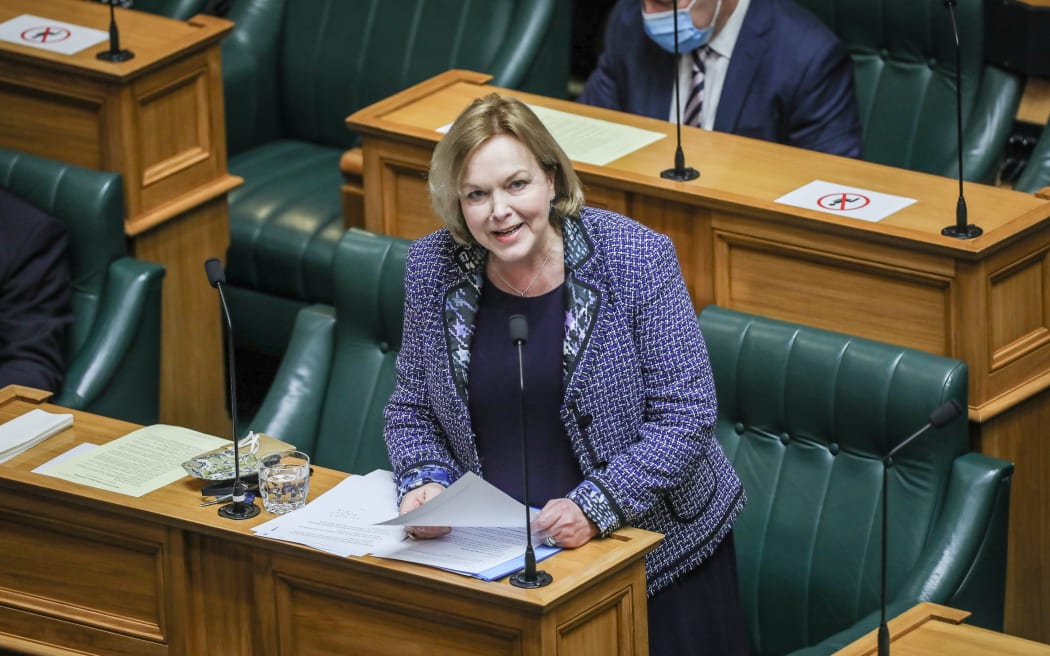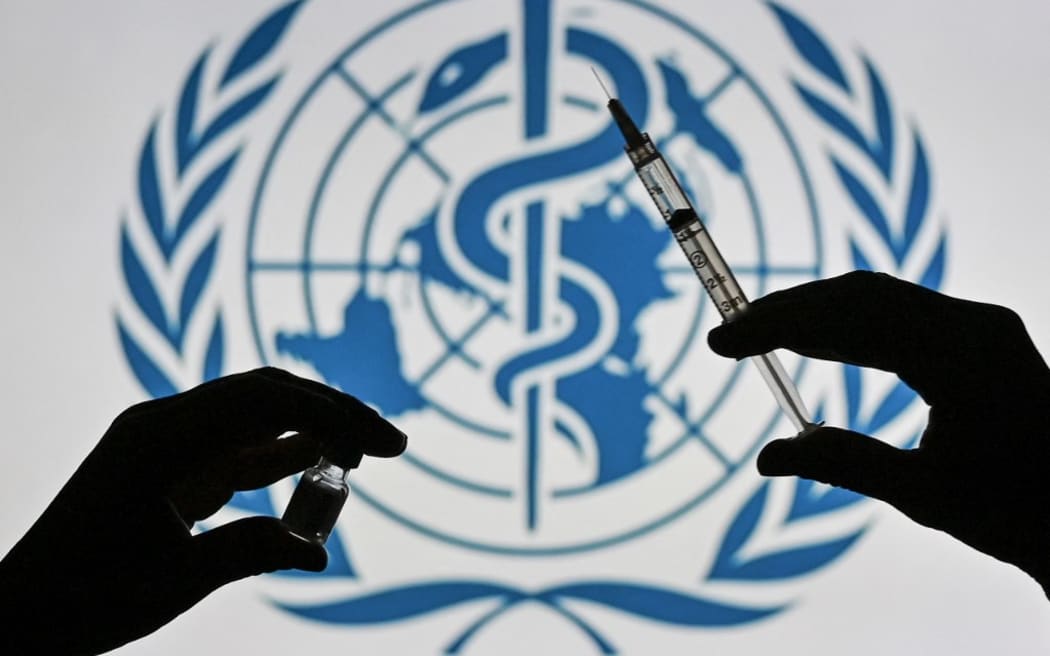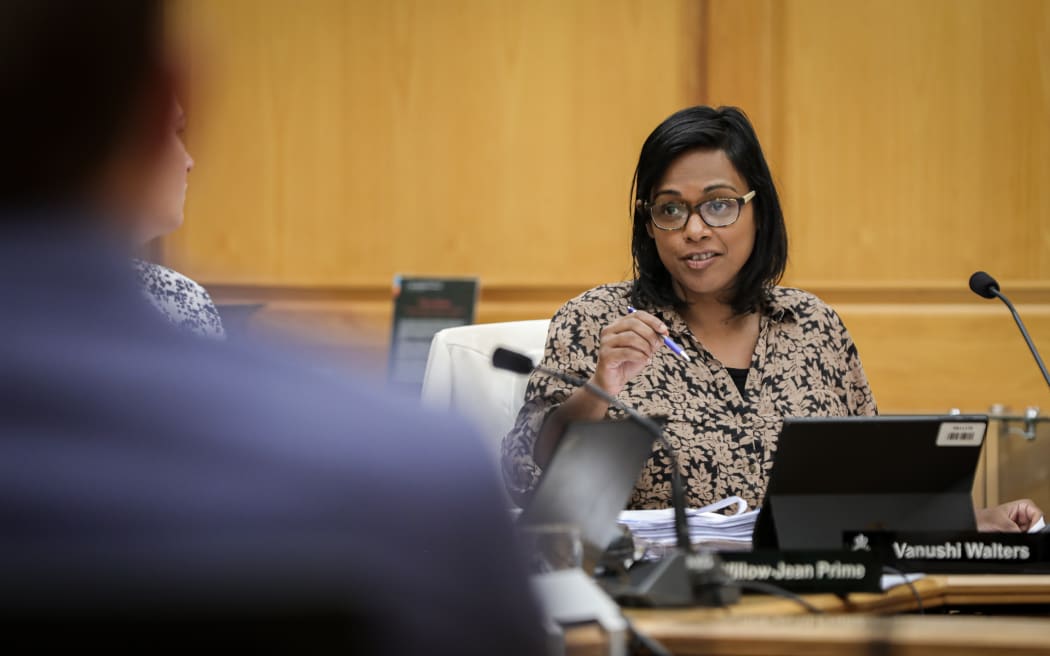This week MPs had a special debate about the report of the Regulations Review Committee on Covid-19 Secondary Legislation.
This specialist committee, which is always chaired by an Opposition MP, plays an important role as a constitutional safeguard and a mechanism for providing checks and balance on the executive.
Part 2 of today’s edition of The House looks at salient points from that special debate on the committee’s report, while Part 1 examines further evidence from the chamber that MPs are getting ever more contrarian as the election looms.

Judith Collins in the House Photo: VNP / Phil Smith
During the special debate, a committee member, Eugenie Sage of the Greens, gave this useful description of the Regulations Review Committee’s function:
“In terms of lawmaking, it scrutinises the powers in bills that are proposed to be given to the executive to make secondary legislation,” she explained.
“So what’s secondary legislation? Law that is made by someone other than Parliament under a power that Parliament has given. It could be regulations, orders, rules, notices, and it’s often of the detail of implementation of legislation.”
The Government's Leader of the House, Grant Robertson, also gave us this useful explainer of the role of the Regulations Review Committee at the start of the week.
Drafting
During the emergency phase of Covid-19, the Regulations Review Committee was particularly busy doing its job looking at each regulatory change - there were many of them. They also compiled a report looking at that whole Covid period, trying to see what can be learnt from that period for how to deal with emergency situations, pandemics and so on, via a regulatory lens.
Generally, the committee found that there have been appropriate safeguards for the making of Covid-19 secondary legislation.
However the committee chair, Judith Collins of the National Party, said one of the big takeaways of this review was how poorly some government ministries and departments took the role of drafting good secondary legislation.
“Now I understand, and we can all acknowledge, that the Ministry of Health was under an extreme amount of stress, that they were dealing with a situation that they had not seen before, and that they were rushing,” she said.
“The problem is, and I’m sure that members when they wish to read the report will understand, if the secondary legislation is being drafted by ministries themselves, rather than Parliamentary counsel office, there is often not the expertise in the ministry to be able to draft clearly and within the rules that are expected of legal drafting. And that was really clear.
“What was also clear that things seemed to not get better but worse as matters went on,” Collins explained.

Photo: Artur Widak/NurPhoto
Collins also said the committee found that the Covid-19 Response Vaccination Legislation Act was not given adequate scrutiny.
“It was legislation that might have been drafted by the Communications Team. It was simply not up to scratch, and nor were the regulations from it. It would have been better if it was less focussed on communications than the law.”
Balance
Trying to navigate the legal requirements of a public health emergency response while keeping information on the pandemic easily digestible for the public was a stern challenge for the Government. Good, clear communications was a key part of the Labour government’s handling of Covid. But ideally a balance was required.
As another committee member, Labour’s Vanushi Walters, pointed out, New Zealand had the lowest Covid mortality and hospitalisation rates in the OECD, something that was and remains the backdrop to deliberations on Covid response actions. She said Government attempted to strike a balance between essentially collective rights and individual liberties.
She cited Justice Minister David Parker in spelling to the risks where, if taken too far, collective rights can actually be used to suppress minorities and individual liberties, but that also, conversely, extreme use of individual liberties trumping community rights can generate unjust outcomes too.
“It is about balance, and it's also about more than the academic balancing of rights. For us it was also about the practicality of assessing the capacity of our health system,” Walters said.

Labour MP Vanushi Walters in committee Photo: ©VNP / Phil Smith
She said the committee found that generally the right balance was achieved by the government in its secondary legislation, but noted that aspects like the traffic lights framework were pushing into new territory.
“In reality what happened is that it was a mix of existing legislation and bespoke legislation that we used in response to Covid, and where our committee landed, is that mix, that hybrid response is really ideal, You need to have something in place so you can take immediate reactions, which we did, But you also need to develop a bespoke response,” Walters said.
The committee also noted that the ongoing nature of the underlying health emergency means that response and recovery may need to proceed in tandem for some time, rather than be seen as separate phases of the emergency.
Turning pages
The committee's report noted that the Government has now recognised that "it's time to safely turn the page on our Covid-19 management, and live without the extraordinary measures that we previously used".
At the start of her speech in the special debate, Judith Collins acknowledged that the Covid emergency was a painful time for many people in New Zealand.
“A very painful time when they felt, in some cases disunited or excluded. This is time for us to bring people back together, and I believe that the role of the Regulations Review Committee and our report is something that will give people heart,” she said.

